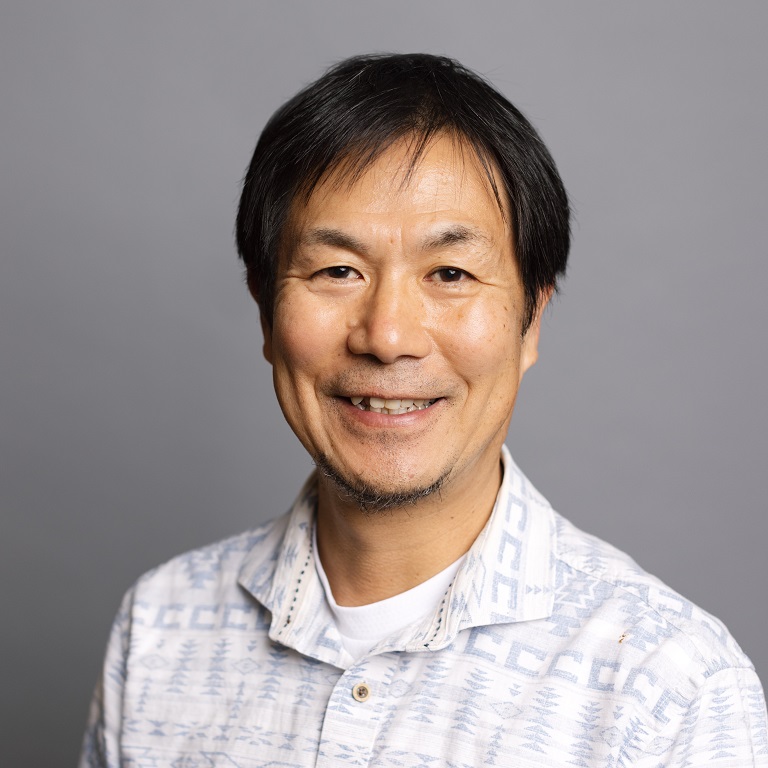- Ph.D., Anthropology, Washington State University, 2006
- M.A., Anthropology, University of Idaho, 2000
- B.A., Anthropology, University of Idaho, 1996
- A.S. and A.A., Anthropology, North Idaho College, 1993

Fumi Arakawa
Associate Professor, Anthropology

Associate Professor, Anthropology
Geographical Areas of Specialization
North America; American Southwest; Japan
Research Interests
Prehistoric American Southwest, Lithic Technological Organization, Pottery Analysis, Sociopolitical Organization in Small-scale Agricultural Societies, Multi-vocal Studies (Collections-based Research and Collaborations), Animacy in Archaeological Research, Eastern and Western Thoughts in Anthropology
Fumi(yasu) Arakawa is an Associate Professor of Anthropology at Indiana University and the Associate Director of Research at the Indiana University Museum of Anthropology and Archaeology (IUMAA). He is also a Research Associate with Crow Canyon Archaeology Center in Cortez, Colorado. Fumi received his B.A. and M.A. from the University of Idaho and his Ph.D. in Anthropology from Washington State University in 2006. Before coming to Indiana University, he was Director of the University Museum and Professor of Anthropology at New Mexico State University.
Fumi’s primary interest in archaeology is reconstructing the sociopolitical organization of Ancestral Puebloan societies of the Mesa Verde region and the Mimbres-Mogollon societies of southwestern New Mexico. His research utilizes demographic, environmental, and material (lithics and pottery) data to examine how social scales and power changed through time in small-scale agricultural societies. To tackle questions of power and scale, he has gained a strong background in archaeological method and theory, geology, and chemical compositional analyses. Fumi has also explored topics related to cultural trajectory, gender division of labor, and exchange systems.
At Indiana University, Fumi intends to expand his multi-vocal studies in archaeology and further pursue the topic of “decolonizing” museums. Collections-based research using the IUMAA’s orphan and legacy collections will offer many opportunities for students and collaborators to work with Fumi on either of these topics. In addition to his museum research, Fumi will continue to direct field programs at the Mimbres site of Twin Pines in the Gila National Forest in New Mexico and Montezuma Canyon and Alkali Ridge in southeast Utah. Working with Indiana University students, he plans to sustain his earlier collaboration with various Southwestern descendant groups such as the Zuni and Hopi, as well as explore collaborative work with tribal groups in the Midwest. In all cases, the intent is to develop mutually beneficial relationships. In addition to his research, Fumi will also teach courses in Archaeology and Museum Studies.
I am always interested in discussing research opportunities for prospective students interested in graduate study at IU. If you have any questions or are interested in applying, please contact me.
2023 Arakawa, Fumiyasu, Aimee Oliver-Bozeman, and Jorden Scott. South Diamond Creek Georgetown Phase Great Kiva in the Diamond Creek Locality of the Gila Forks Region. In Structure and Meaning of Mogollon Communal Spaces and Places in the Greater American Southwest, edited by Robert Stokes, Katherine Dungan, and Jacob Sedig. The University of Colorado Press.
2023 Arakawa, Fumiyasu, Jamie Merewether, and Kate Hughes. Crow Canyon Lithic Analysis as a Tool to Reveal Sociopolitical Organization from A.D. 600 to 1280 in the Central Mesa Verde Region. In Research, Education, and American Indian Partnerships at the Crow Canyon Archaeological Center. The University of Colorado Press, Boulder.
2020 Arakawa, Fumiyasu. Cultural Landscape Studies with Zuni Elders in Gina National Forest (Documentary Film)
https://www.youtube.com/watch?v=Hkv4BqEHGXM
2013 Arakawa, Fumiyasu. Gendered Analysis of Lithics from the Central Mesa Verde Region, American Southwest, Kiva 78:279–312.
2013 Arakawa, Fumiyasu, Christopher Nicholson, and Jeff Rasic. The Consequences of Social Processes: Aggregate Populations, Projectile Point Accumulation, and Subsistence Patterns in the American Southwest. American Antiquity 78:147–164.
2012 Arakawa, Fumiyasu. Cyclical Cultural Trajectories: A Case Study from the Mesa Verde Region. Journal of Anthropological Research, 68:35–69.
2011 Arakawa, Fumiyasu, Scott Ortman, M. Steve Shackley, and Andrew Duff. Obsidian Toolstone Procurement in the Central Mesa Verde. American Antiquity. 76:773-795.